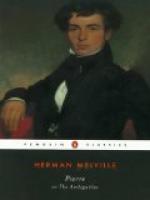|
This section contains 13,103 words (approx. 44 pages at 300 words per page) |

|
SOURCE: “Why an Enthusiast?: Melville’s Pierre and the Problem of the Imagination,” in ESQ: A Journal of the American Renaissance, Vol. 33, No. 3, 3rd quarter, 1987, pp. 146-67.
In the following essay, Simmons suggests that Pierre presents the problem of uncontrolled imagination, and provides evidence from Melville's reading, which includes the works of Isaac Taylor.
Few studies of Herman Melville's Pierre (1852) fail to mention the hero's “enthusiasm” or to refer to Pierre as an “enthusiast,” but seldom does the critic consider exactly what the word implies for our reading of the novel. Lawrance Thompson's statement is typical: “Pierre becomes the allegorical type of the ‘Enthusiast’—literally, God-possessed and God-inspired. And Melville further manipulates the actions of his young enthusiast in such a way as to illuminate his own anti-Christian theological beliefs.”1 Thompson assumes we know how the “allegorical type” will act. He follows Henry Murray's explanation of Melville's “conception...
|
This section contains 13,103 words (approx. 44 pages at 300 words per page) |

|


